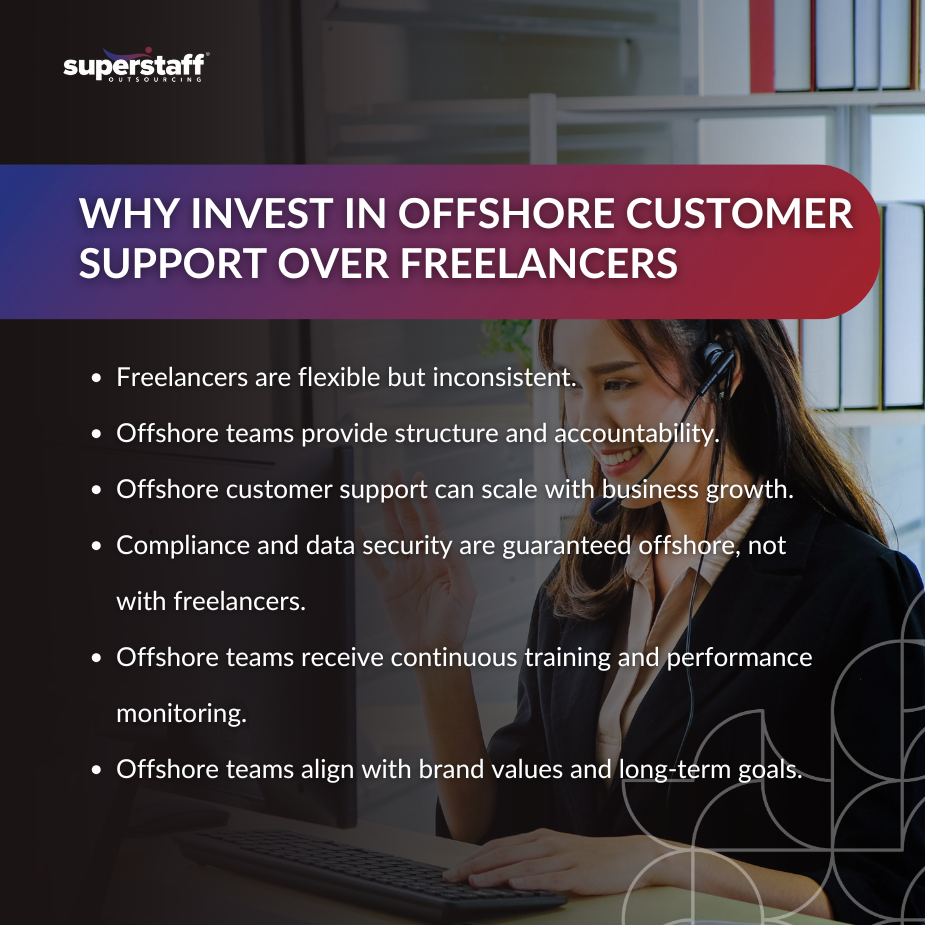
The gig economy has reshaped how businesses think about talent, with many turning to freelancers as a quick fix for customer service needs. Flexible contracts and low upfront costs made the freelance model attractive, especially for startups and growing companies looking to save on overhead. At first glance, it seemed like the perfect solution.
But when customer service is on the line, flexibility alone isn’t enough. Freelancers often juggle multiple clients, lack the structure needed for consistent performance, and struggle to fully align with a company’s brand voice. For roles that demand constant availability, empathy, and accountability, the limitations of the gig model quickly become apparent.
This is where offshore customer support changes the game. Unlike the fragmented nature of freelancing, outsourced teams bring structure, reliability, and the kind of long-term stability businesses need to protect and grow customer relationships. With defined processes, ongoing training, and scalable resources, they deliver what the gig economy simply cannot.
In this blog, we’ll explore why outsourcing to a dedicated offshore partner is not only the smarter choice but also the more sustainable path for businesses that see customer support as a growth driver rather than just a cost to manage.
The gig economy offers flexibility, but at the cost of consistency.
The rise of the gig economy was fueled by its promise of flexibility. For businesses, freelancers offered a cost-effective way to fill gaps without the long-term commitments of full-time employees. Need someone to answer customer emails for a few weeks? A freelancer could step in. Need temporary coverage during a product launch? Another gig worker could be hired overnight. This model provided immediate relief at a fraction of the cost of building an in-house team.
If you’re wondering why companies outsource customer service instead of freelancers, here’s the answer: Flexibility often comes at the expense of consistency. Freelancers typically operate independently, and that independence can clash with the structured demands of customer-facing work.
- Limited bandwidth and availability: Freelancers often work with multiple clients at once, splitting their time across projects. This means they may not always be available when customers need support the most. For businesses that require 24/7 coverage, relying on freelancers can leave dangerous service gaps.
- Challenges aligning with brand values and tone: Customer support is more than answering questions; it’s representing your brand. Freelancers, who may only engage with a business temporarily, often lack the training and immersion needed to embody a company’s voice. This can lead to inconsistent customer experiences.
- Lack of accountability: In the gig economy, freelancers are independent contractors, not employees. Without formal oversight, clear performance metrics, or established escalation processes, accountability becomes murky. If a freelancer misses deadlines, provides poor service, or simply disappears, businesses have little recourse.
While freelancers can provide stopgap solutions, they fall short in delivering consistent, high-quality customer interactions. For businesses that see customer experience as a core competitive advantage, this is a critical weakness. Offshore teams, by contrast, deliver the reliability and structure that customer service demands.

Offshore customer support teams provide structure and consistency that freelancers cannot.
Unlike freelancers, offshore providers operate within a structured business model. They deliver not just manpower, but also systems, processes, and accountability measures designed to ensure consistent service delivery. This structure sets offshore teams apart from gig workers in several key ways.
- Standardized onboarding and training: Offshore providers invest in comprehensive training programs to align teams with client goals, brand values, and service standards. Unlike freelancers who may learn on the job, offshore customer support teams are prepared from day one.
- Continuous monitoring and feedback loops: Offshore teams are managed by supervisors and quality assurance specialists who regularly evaluate performance against defined KPIs. This ensures ongoing improvement and consistency—something freelancers rarely receive.
- Alignment with long-term strategies: Offshore providers work as partners, not just contractors. Their goal is to align with a client’s long-term vision, adapting processes as business needs evolve. Freelancers, by contrast, are typically short-term and transactional.
By offering this structured framework, offshore customer support delivers the dependability that businesses require. Customer service is not about short-term fixes; it’s about building trust with customers over time. Offshore teams provide the consistency needed to maintain and strengthen that trust.
Scalability is a major advantage of offshore outsourcing over gig-based work
One of the biggest limitations of freelancers is their inability to scale. A single freelancer, or even a small group, cannot easily handle sudden increases in customer demand. Offshore staffing solutions, on the other hand, are built to scale.
- Access to large talent pools: Offshore outsourcing hubs like the Philippines offer vast pools of customer service talent. Providers can recruit, train, and deploy new team members quickly, ensuring clients are never caught off guard during demand spikes.
- Seamless handling of seasonal peaks and growth surges: Retailers preparing for holiday surges, or tech startups dealing with sudden user growth, cannot rely on individual freelancers to cover expanded workloads. Offshore customer support teams can scale up or down as needed without disrupting service quality.
- Dedicated teams ensure business continuity: Offshore providers assign dedicated agents to each client. This ensures customers interact with familiar representatives who understand the brand, even as teams expand. Freelancers, by contrast, may rotate in and out, leading to inconsistent experiences.
Scalability is not just about adding more people; it’s about ensuring customers continue to receive the same level of service, no matter how demand fluctuates. Offshore teams provide that assurance, while freelancers often leave businesses scrambling to fill gaps.
Compliance and data security cannot be guaranteed in the gig economy
Customer support isn’t just about answering questions; it involves handling sensitive data. From credit card details to medical information, companies must ensure customer interactions comply with strict data protection regulations. This is where freelancers pose serious risks.
Most freelancers lack the infrastructure, training, or legal accountability to handle regulated data. Offshore providers, however, build compliance into their operations.
- Strict adherence to global regulations: Offshore providers comply with international standards like HIPAA (healthcare), GDPR (Europe), and PCI-DSS (payments). This protects clients from legal liabilities and ensures customer trust.
- Secure infrastructure: Offshore outsourcing centers invest heavily in security protocols, from encrypted communication systems to secure server facilities. These measures are far beyond what an individual freelancer can provide.
- Dedicated compliance teams: Offshore providers employ specialists whose sole responsibility is ensuring ongoing compliance with evolving regulations. Businesses outsourcing customer support can rest assured that their operations remain legally sound.
For companies operating in regulated industries, the risks of using freelancers are too great. Offshore customer support providers offer a safer, more reliable alternative that protects both businesses and customers.
Offshore teams deliver better customer experiences compared to freelancers
Customer support is ultimately about relationships. Customers want empathy, consistency, and seamless service across multiple touchpoints. Offshore providers, with their structured training and oversight, deliver superior experiences compared to freelancers.
- Continuous training in soft skills and empathy: Offshore teams receive ongoing training in communication, cultural awareness, and problem-solving—skills that elevate interactions beyond transactional exchanges.
- Multilingual and omnichannel support: Offshore providers offer teams that can communicate across languages and channels, from phone calls and emails to live chat and social media. This capability is crucial for businesses serving global audiences.
- Consistent brand representation: With dedicated agents working exclusively for one client, offshore teams ensure that every interaction reflects the brand’s values and tone. Freelancers, working with multiple clients, struggle to provide this consistency.
By focusing on customer experience as a long-term investment, offshore customer support providers help businesses build loyalty and trust—two assets that freelancers, working independently, cannot reliably deliver.
Choosing an offshore partner means investing in long-term value, not short-term gig fixes
Customer support should never be treated as a short-term fix. It’s a long-term driver of retention, reputation, and revenue. By partnering with an offshore provider, businesses gain a strategic ally invested in their success.
- Stronger integration with business goals: Offshore providers aim to function as an extension of a client’s team, integrating deeply into workflows and strategies. This is far more valuable than the transactional relationships typical of freelancing.
- Lower attrition and better workforce stability: Offshore teams, managed within established companies, offer greater stability than freelancers, who may leave projects at any time. This stability reduces turnover and training costs.
- Strategic collaboration that drives customer loyalty: Offshore providers partner with businesses to continuously refine strategies, improve performance, and enhance customer satisfaction. This collaboration ensures customer support evolves alongside business growth.
By looking beyond the gig model and investing in offshore partnerships, businesses secure not just a service provider, but a long-term growth partner.
Partner With SuperStaff for Offshore Customer Support That Grows With You
Freelancers offer flexibility and short-term relief, but when it comes to customer support, they fall short in delivering the reliability, scalability, and compliance businesses need. Offshore providers, on the other hand, bring structure, accountability, and long-term value.
Offshore customer support outshines the gig model by offering consistency, scalability, compliance, and superior customer experiences. Freelancers may solve short-term problems, but offshore teams help businesses build lasting trust and loyalty.
For companies serious about growth, the choice is clear: look beyond the gig, and partner with a dedicated offshore team.
Ready to outsource to the Philippines and see the difference? Explore how SuperStaff’s offshore customer support solutions can help your business build stronger customer relationships, ensure business continuity, and grow sustainably in today’s competitive marketplace.






